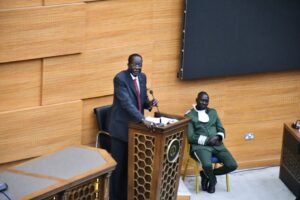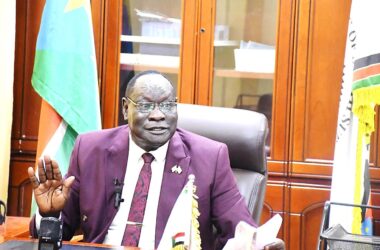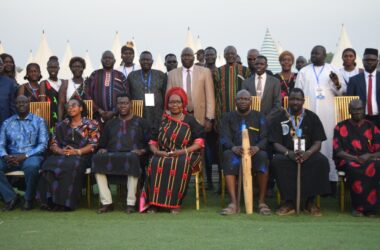
By Alan Clement
Members of the Transitional National Legislative Assembly (TNLA) have pointed fingers at the Ministry of Labour for failing to effectively regulate the private sector and protect local workers.
The lawmakers voiced deep concern over high unemployment rates among South Sudanese youth during a debate on the motion tabled by Martha Akon Deng (Bor County, SPLM-IO), highlighting weak enforcement of labour rights for South Sudanese employees in the private sector. She questioned whether the ministry was doing enough to ensure locals benefit from available jobs.
During the deliberations on the 10th ordinary sitting of the TNLA on Tuesday, August 26, 2025, Bol Joseph Agau (Yirol West) criticized the Ministry’s lack of engagement with unemployed youth. “The youth of this country are very impoverished because of the disorganization of the ministry of labour,” Bol said.
“As we speak, Konyokonyo market is run by foreigners. They are the shopkeepers, retailers, and salespersons” Agau told the August House. He called for a ministerial directive requiring foreign shop owners to employ South Sudanese salespersons, citing the dominance of foreigners in Juba’s Konyokonyo market.
Bol outlined that the absence of reliable data on informal employment such as waiters, drivers, and market vendors limits the government’s ability to respond effectively thus sidelining South Sudanese workers and deepening socioeconomic disparities.
Similarly, Bol Pio (Northern Bahr el Ghazal, SPLM) highlighted exploitative working conditions for young women. “Some work from 7 AM to 11 PM without overtime pay,” he said. “They fear losing their jobs, so I suggest the Ministry establish a landline for anonymous complaint
Responding to MPs, Minister of Labour James Hoth Mai admitted there was a mismatch between the country’s education system and labour market needs. “Government cannot absorb everybody who graduates. The graduates we supply every year do not meet the need of the market. The mismatch in the market is very big,” he said.
The minister also cited inter-agency coordination failures as a major obstacle to labour law enforcement, revealing cases of foreign nationals faking documents and bypassing immigration procedures. “Sometimes the ministry rejects some people, but who will chase them away? We had a case of 10 Chinese nationals who faked documents. We requested their arrest, but they still managed to leave after paying 50 dollars,” Hoth Mai disclosed.
Minister James Hoth also highlighted weak visa enforcement in South Sudan which has contributed to the unchecked influx of foreign workers, exacerbating unemployment among nationals and undermining labour market equity. Despite existing legal provisions under the Labour Act 2017, foreign nationals often bypass formal work permit procedures, either through forged documentation or by exploiting loopholes in immigration enforcement.
According to the minister, the lack of robust visa categorization such as distinguishing between business, employment, and residency visas complicates enforcement, allowing foreigners to operate informally while nationals struggle to access decent work.
This regulatory gap not only undermines the Ministry’s mandate to promote inclusive labour practices but also fuels public frustration over youth unemployment.
However, the Ministry of Labour, mandated to regulate the private sector, reported that 6,172 work permits were issued in 2024 and 2,739 permits between January and July 2025. Regulations require at least 80 percent of management roles to be filled by South Sudanese where skills exist.
Despite ongoing efforts, including the development of a minimum wage policy with ILO and UNDP support, MPs said weak monitoring and inadequate resources continue to frustrate employment opportunities for nationals.
Nonetheless, MPs insisted that without urgent reforms, South Sudan’s youth will remain sidelined in their own economy. “These are national issues,” said Agau. “And they demand national solutions,” he added.
The Assembly resolved to strengthen oversight of the ministry’s operations to ensure that South Sudanese workers are prioritized in the country’s


